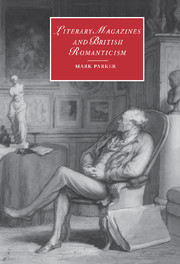Book contents
- Frontmatter
- Contents
- Acknowledgments
- Introduction: the study of literary magazines
- Chapter 1 Ideology and editing: the political context of the Elia essays
- Chapter 2 A conversation between friends: Hazlitt and the London Magazine
- Chapter 3 The burial of Romanticism: the first twenty installments of “Noctes Ambrosianae”
- Chapter 4 Magazine Romanticism: the New Monthly 1821–1825
- Chapter 5 Sartor Resartus in Fraser's toward a dialectical politics
- Conclusion
- Notes
- Bibliography
- Index
- Cambridge Studies in Romanticism
Chapter 5 - Sartor Resartus in Fraser's toward a dialectical politics
Published online by Cambridge University Press: 22 September 2009
- Frontmatter
- Contents
- Acknowledgments
- Introduction: the study of literary magazines
- Chapter 1 Ideology and editing: the political context of the Elia essays
- Chapter 2 A conversation between friends: Hazlitt and the London Magazine
- Chapter 3 The burial of Romanticism: the first twenty installments of “Noctes Ambrosianae”
- Chapter 4 Magazine Romanticism: the New Monthly 1821–1825
- Chapter 5 Sartor Resartus in Fraser's toward a dialectical politics
- Conclusion
- Notes
- Bibliography
- Index
- Cambridge Studies in Romanticism
Summary
Sartor Resartus is, as Thomas Carlyle himself termed it, a “questionable little book.” Commentators have been sharply divided over its genre: one insisting that it is a novel, one that it is “a form of the persuasive essay,” still others an anti-novel. Its unity has been debated: one critic finding its last four chapters obtrusive (“a coda to the biography and the clothes philosophy, perhaps even marring the symmetry”); another contending that it is “a work of fragments: but it is a work, the whole somehow fused into unity.” Finally, Sartor has figured prominently in antithetical accounts of English Romanticism. M. H. Abrams, in a typically precise formulation, notes that Teufelsdröckh's life recalls “the familiar Romantic model of the self-formative educational journey, which moves through division, exile, and solitariness toward the goal of a recovered home and restored familial relationship,” while Anne Mellor argues that Sartor “exhibit[s] a structure that is deliberately open-ended and inconclusive.” Questionable indeed.
This range of critical response can partly be attributed to the nature of Sartor. Carlyle had spent much of the 1820s introducing German literature and philosophy to the British reading public, and Sartor bristles with this learning. Hence it is reasonable to connect the book with this intellectual tradition as well as the native one. There is a strongly autobiographical element to Sartor, one seemingly authorized by Carlyle in subsequent statements, which makes it reasonable to read the book in this context.
- Type
- Chapter
- Information
- Literary Magazines and British Romanticism , pp. 157 - 181Publisher: Cambridge University PressPrint publication year: 2001



